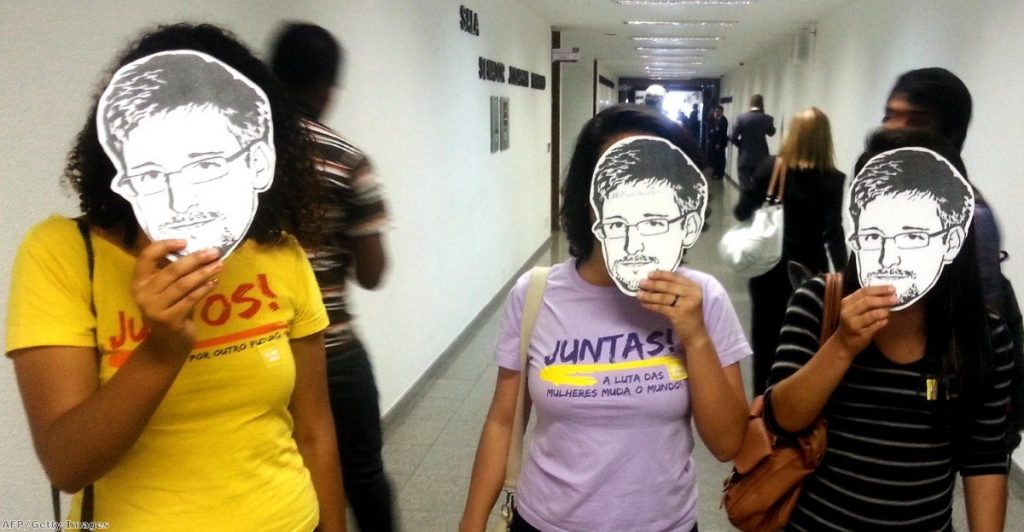Labour demands answers on Heathrow terror arrest
Labour has demanded answers from the Home Office after the partner of a journalist connected to the Edward Snowden revelations was detained under anti-terror laws.
David Miranda was stopped on his way home to Rio de Janeiro from Berlin. The questions he was asked during the nine-hour detention centred on the activities of his partner, Glenn Greenwald, who is the lead journalist working with US whistleblower Snowden.
"Any suggestion that terror powers are being misused must be investigated and clarified urgently," Labour shadow home secretary Yvette Cooper said.
"The Home Office and police need to explain rapidly how they can justify using terrorism legislation to detain David Miranda for nine hours. This has caused considerable consternation and swift answers are needed."


David Anderson, the independent reviewer into anti-terror laws, has demanded a briefing into the decision to detain Miranda.
Home affairs committee chair Keith Vaz said he would write to police demanding information about the arrest.
"What needs to happen pretty rapidly is we need to establish the full facts – now you have a complaint from Mr Greenwald and the Brazilian government," he told BBC Radio 4.
"They indeed have said they are concerned at the use of terrorism legislation for something that does not appear to relate to terrorism, so it needs to be clarified, and clarified quickly."
"What is extraordinary is they knew he was the partner [of Greenwald] and therefore it is clear not only people who are directly involved are being sought but also the partners of those involved," he said.
Fellow Labour MP Tom Watson said it raised the prospect of ministers being involved in the decision.
"It's almost impossible, even without full knowledge of the case, to conclude that Glenn Greenwald's partner was a terrorist suspect," he said.
"I think that we need to know if any ministers knew about this decision, and exactly who authorised it."
Miranda was questioned under schedule seven of the Terrorism Act 2000, which allows authorities at airports, ports and borders considerable powers to stop and search people without prior authorisation or reasonable suspicion.
There is no right to legal advice under schedule seven and people cannot refuse to cooperate.
The government is considering limiting the period someone can be detained to six hours, but current rules allow for a maximum of nine hours before release or arrest.
Miranda was kept for the entire duration – an extremely rare occurrence. Most people who are detained are released within an hour.
He was then released, although his mobile phone, laptop, camera, memory sticks, DVDs and games consoles were kept.
He finally spoke about his ordeal when he arrived at his destination this afternoon.
"I remained in a room. There were six different agents coming and going," he said.
"They asked questions about my entire life, about everything.
"They took my computer, video game, mobile phone, my memory card. Everything."
Greenwald said: "This is a profound attack on press freedoms and the news gathering process.
"To detain my partner for a full nine hours while denying him a lawyer, and then seize large amounts of his possessions, is clearly intended to send a message of intimidation to those of us who have been reporting on the NSA and GCHQ. The actions of the UK pose a serious threat to journalists everywhere.
"But the last thing it will do is intimidate or deter us in any way from doing our job as journalists. Quite the contrary: it will only embolden us more to continue to report aggressively."
The government of Brazil said: "This measure is without justification since it involves an individual against whom there are no charges that can legitimate the use of that legislation.
"The Brazilian government expects that incidents such as the one that happened to the Brazilian citizen today are not repeated."
Nick Pickles, director of privacy and civil liberties campaign group Big Brother Watch, said: "This is a direct attack on freedom of the press and a chilling reminder that our anti-terror laws are in desperate need of reform. Whoever took the decision to have David Miranda arrested and detained should be named and held publicly accountable for this flagrant abuse of anti-terrorism laws.
"The law David Miranda was detained under provides powers to deal with those suspected of involvement with acts of terrorism, not a license to interrogate those with knowledge of the activity of journalists. If a foreign government detained the partner of a British journalist we would rightly be up in arms."
Amnesty International also raised questions about the use of terror legislation for seemingly disconnected investigations.
The Guardian has been the lead newspaper releasing documents secured by Snowden, who is currently in Russia after being granted asylum.
The whistleblower was told by Russian president Vladimir Putin that he could no longer release documents which damage the US, but the former CIA computer specialist is understood to have already given the files to the Guardian before he flew to Sheremetyevo international airport.
In a statement, the Home Office said schedule seven was an "essential" part of the government's counter-terror capacity.












